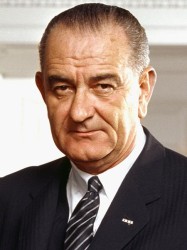
Lyndon B. Johnson (March 1964)
(Photo: Arnold Newman, WHite House Press Office)
(Revised January 4, 2019)
Johnson’s “Great Society” idea was also presented in his State of the Union Address on January 4, 1965.
New York Times report on the speech.
Video and Transcript of the Johnson’s State of the Union address
President Lyndon B. Johnson, “The Great Society” Speech (University of Michigan, May 22. 1964)
Each year more than 100,000 high school graduates with proved ability do not enter college because they cannot afford it. And if we cannot educate today’s youth, what will we do in 1970 when elementary school enrollment will be five million greater than 1960? And high school enrollment will rise by five million. And college enrollment will increase by more than three million.
In many places, classrooms are overcrowded and curricula are outdated. Most of our qualified teachers are underpaid, and many of our paid teachers are unqualified. So we must give every child a place to sit and a teacher to learn from. Poverty must not be a bar to learning, and learning must offer an escape from poverty.
But more classrooms and more teachers are not enough. We must seek an educational system which grows in excellence as it grows in size. And this means better training for our teachers. It means preparing youth to enjoy their hours of leisure, as well as their hours of labor. It means exploring new techniques of teaching, to find new ways to stimulate the love of learning and the capacity for creation.
Source: American Experience-PBS: “LBJ”
A few months after declaring a “War on Poverty,” President Lyndon B. Johnson outlined his ambitious domestic agenda to end poverty, improve the status of African Americans and create a more equal and just American society. In the speech Johnson said,
The Great Society rests on abundance and liberty for all. It demands an end to poverty and racial injustice, to which we are totally committed in our time. But that is just the beginning.
The range of programs that were introduced fifty years ago included Medicare, Medicaid, food stamps, Head Start, and the Job Corps.
In April 2014, New York Times reporter Trip Gabriel assessed the War on Poverty half a century later in “Fifty Years Into the War on Poverty, Hardship Hits Back.”
President Johnson was a schoolteacher in a poor, rural district in Texas before entering politics. Read more about his life, administration and legacy in Don’t Know Much About the American Presidents and Don’t Know Much About History.